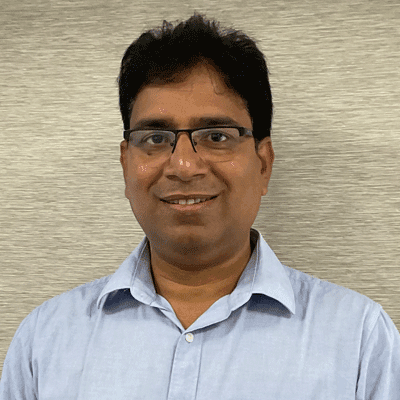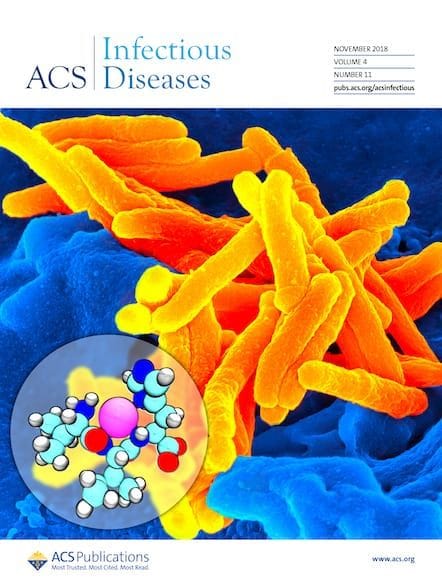
ACS Publications is pleased to announce that Professor Jayanta Haldar has been appointed Editor-in-Chief of ACS Infectious Diseases, following the departure of the founding Editor-in-Chief, Dr. Courtney Aldrich.

Dr. Haldar is a distinguished Professor in the New Chemistry Unit at the Jawaharlal Nehru Centre for Advanced Research (JNCASR) in Bangalore, India. He is also affiliated with the School of Advanced Materials (SAMat) at JNCASR. His research group has made significant contributions in the areas of Medicinal Chemistry, Chemical Biology and Biomaterials, with the aim of tackling and preventing antimicrobial resistance and associated infections.
When asked about his vision for the outlook of the journal, Dr. Haldar said,
“ACS Infectious Diseases is a relatively young journal, which has carved for itself a unique space and high standing as a leading journal in the field of infectious diseases. The journal’s increasing impact factor and the exceptional quality of published articles attest to its consistent growth as do the expanding readership and authorship figures.”
Read our interview with new Editor-in-Chief Jayanta Haldar
What drew you to work in infectious diseases research?
I was initially drawn to work in infectious diseases during my Ph.D. studies when I had the opportunity to explore the antibacterial properties of cleavable amphiphiles. The emerging field of membrane-perturbing amphiphiles as antimicrobial agents fascinated me, and I found the process of testing their antibacterial activity to be incredibly intriguing. This experience piqued my interest in infectious diseases, and I made sure to stay updated on advancements in the field. During my postdoctoral research at Massachusetts Institute of Technology (MIT), I focused on developing polymeric therapeutics and biomaterial-based strategies to combat one of the most common, prevalent and dangerous respiratory viruses, Influenza. This experience further solidified my conviction that infectious diseases pose a significant and deadly challenge, particularly in developing countries like India.
Growing up in my village, I witnessed first-hand the lack of sanitation, basic healthcare facilities, and the urgent need for resilient diagnostics and therapeutics. These experiences deeply influenced and motivated me to shape my independent research activities around the field of tackling antimicrobial resistance (AMR) and associated infections.
Overall, my fascination with antimicrobial research during my Ph.D. and postdoctoral training as well as the realization of the critical need for infectious diseases research in India, influenced by my personal experiences, have been the driving forces behind my decision to work in the field of infectious diseases.
What are you currently working on?
Currently, my lab is engaged in several cutting-edge projects aimed at developing next-generation multifunctional therapeutic strategies and establishing drug-discovery platforms. A key focus of our work also lies in addressing the challenge of antimicrobial resistance (AMR) and infection-associated physiologies by developing smart biomaterials.
Over the past years, we have successfully developed superior semisynthetic antibiotics as well as synthetic small and macromolecular membrane-perturbing antibiofilm agents. We also work on the development of antibiotic adjuvants to repurpose and revitalize obsolete or redundant antibiotics, specifically targeting Gram-negative superbugs. Additionally, we are exploring non-traditional mechanisms of action for antibiotics and semisynthetic derivatives, expanding the potential of antimicrobial therapies.
In parallel to our drug discovery efforts, we are actively involved in the development of smart biomaterials for mitigating infections and promoting wound healing. Our research has led to the creation of antimicrobial coatings capable of eradicating bacteria, fungi, and viruses. We have also engineered antimicrobial-hemostatic sponges, antimicrobial sealants and hydrogels, serving as point-of-care solutions for deep-tissue injuries.
The ultimate goal of our laboratory is to integrate knowledge from the fields of medicinal chemistry, chemical biology, infection biology, and biomaterials. By doing so, we strive to develop simple, resilient, and translatable therapeutic and biomaterial interventions. Through interdisciplinary collaboration and the application of our expertise, we aim to make significant advancements in combating infectious diseases, tackling antimicrobial resistance, and improving patient outcomes.
What’s one area of infectious diseases research that has you really excited for the future?
The field of infectious diseases presents an exciting opportunity for interdisciplinary collaboration, which is essential for tackling the diverse nature of infectious diseases and pathogens. The integrated approach involving multiple disciplines including medicinal chemistry, chemical biology, pharmacology, computational biology, microbiology, immunology, epidemiology and clinical research, holds promise for addressing infectious diseases effectively.
One area of infectious diseases research that particularly excites me is the interplay between antimicrobial therapy and host-mediated pathogen clearance. Infections involve dynamic and complex interactions between the host and the pathogen, which play a crucial role in the progression and resolution of the infection. Understanding and harnessing these intricate host-pathogen interactions are vital considerations in developing effective therapies.
This research area also encompasses the association of microbial infections with other host physiological responses, such as hyper-inflammation and sepsis. It is increasingly evident that therapeutic solutions need to account for these complex interactions and their impact on infection outcomes. Developing dual-functional and host-modulating therapies that not only target the pathogens but also modulate the host response to infection holds great promise in this regard.
In our laboratory, we have already begun exploring aspects related to this exciting research area. I am thrilled to see that many leading labs in the field are also moving towards investigating this interplay between antimicrobial therapy and host-mediated pathogen clearance. I believe that in the coming years, this field will witness significant advancements and emerge as a prominent area of research.
You’re the one of the first Editor-in-Chiefs of an ACS journal based in India. How will that bring a unique perspective to the journal?
As the Editor-in-Chief of an ACS journal based in India, my appointment brings a unique perspective and represents a significant milestone for the journal and the scientific community in India. It signifies the inclusive nature of the ACS and highlights the increasing participation and contributions of Indian/Asian researchers and scientists to ACS journals.
India faces specific challenges in the field of infectious diseases, given its status as an emerging and developing country. Having a deep understanding of the Indian research and science community, as well as the unique context and needs of the country, I can bring a nuanced perspective to the journal. This first-hand experience allows me to identify emerging trends, highlight relevant research, and provide guidance that is specifically tailored to the Indian scientific community, and in a broader sense, that of the global southern developing countries.
Furthermore, my role as an Editor-in-Chief based in Asia, and specifically in India enables me to foster collaborations and networks within the Asian research community. I can actively engage with researchers, institutions, and organizations working on infectious diseases, encouraging them to contribute their valuable insights and research findings to ACS Infectious Diseases. By doing so, I hope to create a platform that promotes and showcases the remarkable work being done in emerging and developing countries, while also facilitating knowledge exchange and collaboration on a global scale.
What are your goals for ACS Infectious Diseases for 2024 and beyond?
ACS Infectious Diseases is a highly esteemed journal in the field, renowned for attracting diverse authorship and readership. My earlier association with ACS Infectious Diseases as an author-contributor, reviewer, and member of the Editorial Advisory Board has been a privilege and has deepened my appreciation for the journal’s excellence. As the Editor-in-Chief, I am honored to take part in continuing the illustrious legacy of ACS Infectious Diseases and driving the journal’s progress.
To achieve our goals, I will collaborate closely with our esteemed team of Associate Editors, Managing Editor, Topic Editors, Editorial Advisory Board members, and other stakeholders at ACS Infectious Diseases. One of our key objectives includes encouraging diversity representation and inclusion in the journal team and the advisory board. We will also undertake efforts toward enhancing the journal’s public outreach and interactions. Additionally, we plan to establish an Early Career Advisory Board, engaging emerging researchers in shaping the future of ACS Infectious Diseases. I am also committed to making positive changes in the article peer review and publication process. As a committed team, we will streamline the journey from submission to publication, delivering a seamless experience for authors and readers alike. The aim is to establish ACS Infectious Diseases as the preferred journal for researchers working in the field of infectious diseases. Through our collaborative efforts, dedication to excellence, and innovation in scholarly publishing, we will foster a vibrant and impactful platform for advancing infectious diseases research and driving positive change in the field.
What interests and hobbies do you enjoy outside of work?
Beyond academic pursuits, I have a range of interests and hobbies that bring me joy and help me unwind. As a sports enthusiast, I find great pleasure in watching various sports including football, tennis, and cricket. I love to play football and badminton. I also enjoy listening to Indian and Western music. I love to travel and explore new places, cultures, and cuisines which allows me to broaden my perspective and gain new insights.
